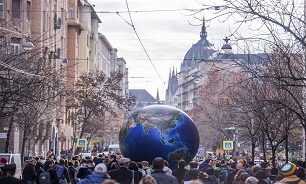UN Climate Summit Postponed until 2021 Because of COVID-19
 The UK government said the meeting, due to take place in Glasgow, Scotland, in November, will now be held next year at a date still to be determined.
The UK government said the meeting, due to take place in Glasgow, Scotland, in November, will now be held next year at a date still to be determined.
The government said in a statement that “in light of the ongoing, worldwide effects of COVID-19, holding an ambitious, inclusive COP26 in November 2020 is no longer possible.” The meeting is formally known as the 26th Conference of the Parties, AP reported.
The decision was made by the United Nations Framework Convention on Climate Change, Britain and Italy, which had been due to host some preparatory events.
Scottish First Minister Nicola Sturgeon tweeted that it was a “disappointing decision, but absolutely the right one as we all focus on the fight against #coronavirus.”
Glasgow’s SEC Arena, which had been due to host the event, has been named as the site of a temporary hospital for COVID-19 patients.
Prime Minister Boris Johnson has made tackling climate change a priority, but Britain’s tenure at the helm of the conference got off to a bumpy start even before the coronavirus pandemic. In January, Johnson fired Claire O'Neill, a former British government minister appointed last year to head the event, and replaced her with Business Secretary Alok Sharma.
“We will continue working tirelessly with our partners to deliver the ambition needed to tackle the climate crisis and I look forward to agreeing a new date for the conference,” Sharma said Wednesday.
Patricia Espinosa, who heads the UN climate office, said the new coronavirus “is the most urgent threat facing humanity today, but we cannot forget that climate change is the biggest threat facing humanity over the long term.”
UN Secretary-General Antonio Guterres stresses that safeguarding lives “is our foremost priority" but countries must step up action on climate change especially as they recover from the COVID-19 pandemic, UN spokesman Stephane Dujarric said.
“Countries must work to protect the health of people, and the planet has never been more at risk,” the UN chief’s spokesman said. “Solidarity and greater ambition is needed now more than ever to transition to a sustainable, resilient low carbon economy that limits global warming to 1.5 degrees Celsius (2.7 degrees Fahrenheit).”
The meeting in Glasgow would have been held five years after the 2015 Paris climate accord was agreed. Countries that signed the landmark agreement are still expected to provide an update on their efforts to reduce greenhouse gas emissions driving global warming.
In the Paris Agreement, countries agreed to limit global warming to 2 degrees Celsius (3.6 degrees Fahrenheit) and do their best to keep it below 1.5 degrees C (2.7 degrees Fahrenheit) by the end of the century, compared with pre-industrial times.
President Donald Trump has triggered the United States's withdrawal from the Paris accord, a move that formally comes into force in November. His Democratic rivals have said they would rejoin if elected.
Environmental campaigners said postponing this year's UN talks was the right move.
“It doesn’t make sense to bring people from every country together in the middle of a pandemic," said Mohamed Adow, a longtime participant at UN climate meetings who heads the think tank Power Shift Africa.
Adow said postponing the conference mustn't stop countries from taking action to curb global warming, though, and suggested plans to revive economies after the pandemic ends should avoid propping up the kinds of industries that contribute to climate change.
“Economies in the rich north must not be kick-started with dirty investment that will lead to climate suffering in the global south,” he said.
Environment officials are planning to hold a lower-level meeting online at the end of April.
